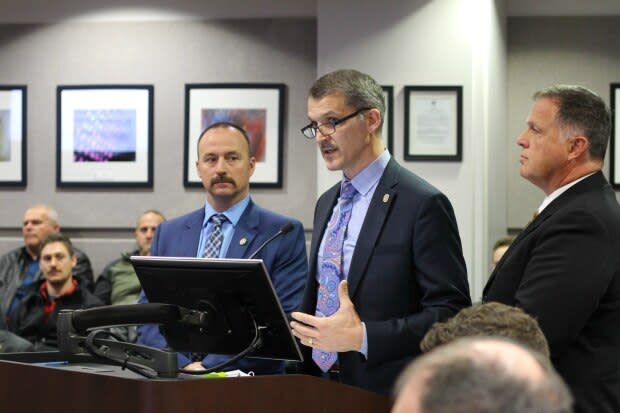Moncton, Saint John join call for binding arbitration changes
All eight city councils in New Brunswick have voted to support changes to provincial legislation used when a municipality and fire or police union can't reach a negotiated contract.
The votes Nov. 12 and Monday were part of a campaign by the Cities of New Brunswick Association to show support for changes to the binding arbitration process just before the legislative assembly resumes.
Councils in Fredericton, Edmundston, Campbellton, Bathurst, Dieppe and Miramichi voted last week, while Moncton and Saint John voted Monday.
The province has already signalled it's open to changing the process that cities say has created a financial burden.
"I've always heard the system is broken, and I'd argue it's not," Glenn Sullivan, president of the Atlantic Firefighters Association, told Moncton council. He said most contracts are reached through negotiation, not binding arbitration.

Moncton's vote came a week after councillors delayed a decision while seeking more information. Councillors Bryan Butler, Brian Hicks and Paul Pellerin voted against the motion Monday, while Coun. Shawn Crossman was absent.
Several dozen members of IAFF Local 999, which represents Moncton firefighters, packed the public gallery. In Moncton, the changes would only apply to firefighters as RCMP negotiate with the federal government.
Mayor Dawn Arnold said the votes are only the start and it's now up to the province to amend the Industrial Relations Act. She said her understanding is that could start this month.
The throne speech, used to outline a government's legislative priorities, is scheduled for Tuesday afternoon.

Under the Industrial Relations Act, unionized municipal firefighters and police cannot strike. Instead, the sides enter binding arbitration with a panel that considers how to set pay often by considering salaries of police and firefighters in similar communities in the province.
The cities say process doesn't consider a community's ability to pay, leading to salary increases for emergency responders that are out of line with other municipal workers.
Changes sought
Cities want arbitrators to be required to consider several criteria when issuing a decision:
Terms and conditions of employment of employees in the public and private sectors.
Collective bargaining settlements reached in the same municipality and in comparable municipalities,
Economic health of New Brunswick and the municipality, including changes to the labour market, property tax and socioeconomic characteristics,
The ability to attract and retain qualified firefighters and police personnel,
The interest and welfare of the community served,
Any local factors affecting the community.
The unions say changes would unfairly favour the employer.
The province committed to consider reform as part of a report on Saint John's fiscal sustainability earlier this year.

The previous Liberal government abandoned plans to implement changes to binding arbitration in 2016 amid labour opposition. The Liberals had a majority, though the Progressive Conservatives now govern with a minority supported by the People's Alliance.
"As you saw here tonight with probably 45 firefighters in the audience, it's controversial, it's emotional. It will be probably a challenge for the province," Arnold said when asked about the prospects of any proposed legislation.
Sullivan plans to speak with the province's political parties about the issue.
"I know that with a minority government there's a better chance there to try to sway the votes one way or the other," Sullivan said. "But all we're asking for any MLAs is to get the information and not to just go and pass something that sort of overrules 50 years of arbitration jurisprudence in New Brunswick."
Agreements expiring
The debate takes place as contracts with firefighters in Moncton, Saint John and Fredericton are set to expire at the end of the year, triggering a new round of negotiations.
Moncton's last collective agreement reached in 2016 saw wage increases of 2.97 per cent annually for four years, similar to increases in Fredericton and Saint John. At the time, Moncton's former city manager told CBC the city felt it needed to grant the increase to avoid the risk of arbitration.
Moncton's proposed 2020 budget includes $50,000 city staff say has been set aside should the sides enter into binding arbitration.


